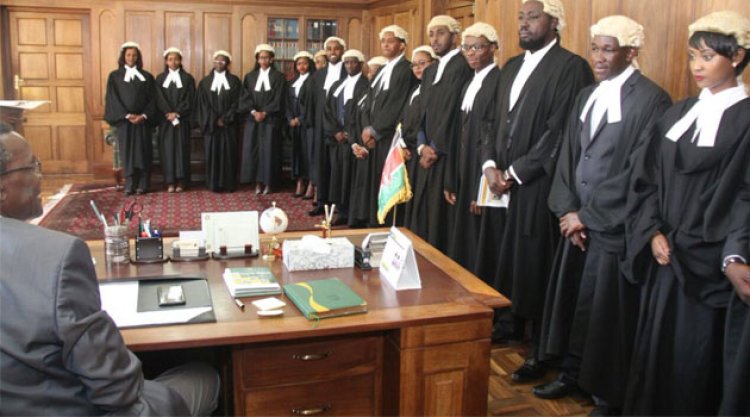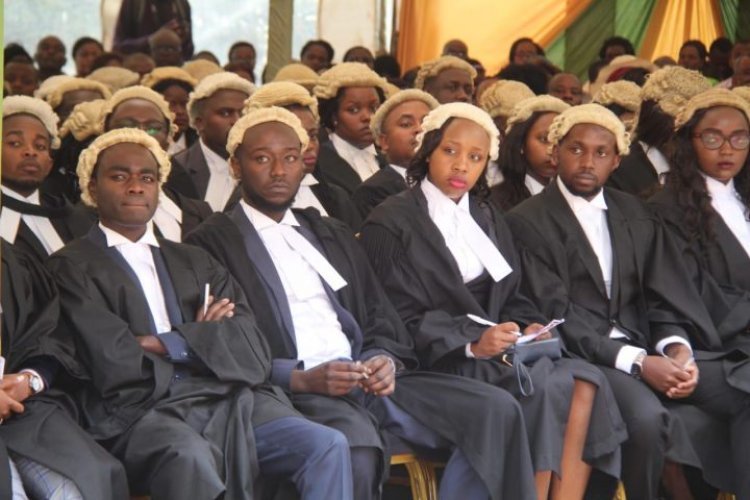How To Find & Verify Licensed Lawyers In Kenya Through LSK Portal
Worries have since swirled regarding the credibility of the legal profession which is the latest to be hit by individuals who pose as lawyers without the required license.

The saga surrounding Brian Mwenda, who was exposed by the Law Society of Kenya (LSK) for masquerading as a lawyer and practising without a license sent shockwaves across the country and the world, rattling the legal profession.
On Monday, October 16, LSK Nairobi Branch, through the Rapid Action Team (RAT) and President Eric Theuri, with the support of Capitol Hill Police Station Officers, nabbed another fake lawyer, Sharon Adunya Atieno, for impersonating an Advocate of the High Court of Kenya and masquerading under a registered lawyer.
"The said quack had stolen the identity of one Sharon Atieno Obade which she used to carry on and represent herself in court and in her daily duties, thus deceiving the unsuspecting members of the public," stated LSK Nairobi on X (formerly Twitter).
A video seen by Viral Tea showed her at a coffee restaurant when she was picked up by a police officer in uniform as well as Theuri and led out of the premises to Capitol Hill Police Station, where she is being held pending investigations and arraignment in Court.
She was accused of forging a National Identity Card and a Practising Certificate to affix the real Sharon Atieno Obade’s identity, which she used to run the law firm of Auma & Co. Advocates as a partner, pretending to be an Advocate.
"It’s unfortunate that the masquerader is a student at the Kenya School of Law who is yet to complete her studies to qualify for admission to the bar," added LSK Nairobi.
Worries have since swirled regarding the credibility of the legal profession which is the latest to be hit by individuals who pose as lawyers without the required license.
To combat this, LSK established rigorous measures to ensure that only licensed legal practitioners are authorised to practice law in the country. One of them is a dedicated online portal through which individuals can verify whether a lawyer is licensed to practice and affiliated with a specific firm.
Viral Tea takes you through the steps to verify the status of a lawyer:
How To Verify
- First, go to the LSK portal website which is online.lsk.or.ke which can be accessed after searching 'LSK advocates' on any search engine.
- You will be taken to a page on the portal featuring a search area written 'search advocate'
- Type in the full name of the lawyer and click search
- If the lawyer is registered, a photo and company he works for, practising year, address and practising status will be displayed as results. However, if he or she is not registered the results will read 'no results found'.
The portal also keeps a record of inactive lawyers, suspended, those struck off and even those who have passed on.
"Disclaimer: The information on this website is provided in good faith and has been derived from sources believed by the Law Society of Kenya to be reliable and accurate at the time of providing it. Therefore, every effort has been made to ensure that the information is accurate and up-to-date.
"However, the Law Society of Kenya does not make any representations, warranties or guarantees regarding the accuracy, completeness or currency of the information, and therefore repudiates any liability for any loss, damage or harm suffered as a consequence of relying on this information," the portal indicates.
Additionally, the Advocates Act stipulates severe consequences for those falsely claiming to be advocates, prohibiting them from seeking remuneration for legal services rendered.
How To Get Admitted To The Bar
Admission of lawyers to the bar marks a transition from studies to practising what they have been studying. However, law happens to be one of the most rigorous professions in Kenya and the world alongside medicine.
The rigorous training is hinged on the importance of the services these professionals offer and the delicate nature of the issues they need to handle.
The journey to the status of a lawyer and an Advocate of the High Court in Kenya begins in high school after one completes primary education and transitions to this level.
Any student who wants to pursue a bachelor's degree in Law (LLB) needs to excel in language subjects, in the Kenyan context, Kiswahili and English. Legal education legislations demand that before undertaking LLB one must have scored a mean grade of at least a C+ in Kenya Certificate of Primary Education (KCPE) with a B in either English or Kiswahili.
The exclusivity of law is that it cannot be studied on a crash programme basis and students mandatorily study for four years.
Once one has completed their undergraduate degree in law they are identified as a lawyer, however, it does not entitle one to practice law, especially representing clients in the courtrooms, even though one can work as a researcher in a law firm.
“After completing your undergraduate studies one is supposed to enrol to the Advocates Training Programme at the Kenya School of Law (KSL). Here is where you study to become an Advocate of the High. The programme takes 18 months inclusive of pupillage,” an advocate explained in a past interview.

Lawyers during a past admission to the bar. /THE KENYA JUDICIARY
“A lawyer cannot practice in court and cannot draw documents. The only option is to be a researcher or join academia while an Advocate of the High Court is a licensed lawyer who can do everything under the Advocates Act like representing clients, drawing and commissioning documents."
For one to transition from this level, one must pass exams on all nine legal subjects at the Kenya School of Law (KSL). One needs to get at least 50 per cent per unit with oral examinations accounting for 20 per cent which is distributed among all the units and a project for every unit which accounts for 20 per cent.
Failing even a single exam at this training level means one must redo the paper until one passes it. It is after one passes their examinations at KSL and completes their pupillage that they can petition the Chief Justice (CJ) for admission to practice law in the country.
In territories like the United Kingdom, pupillage is a two-month training period for individuals who want to become barristers. These students will have to spend the 12 months in a barrister’s chamber and shadow cases of experienced barristers for six months and their own in the final six months.






